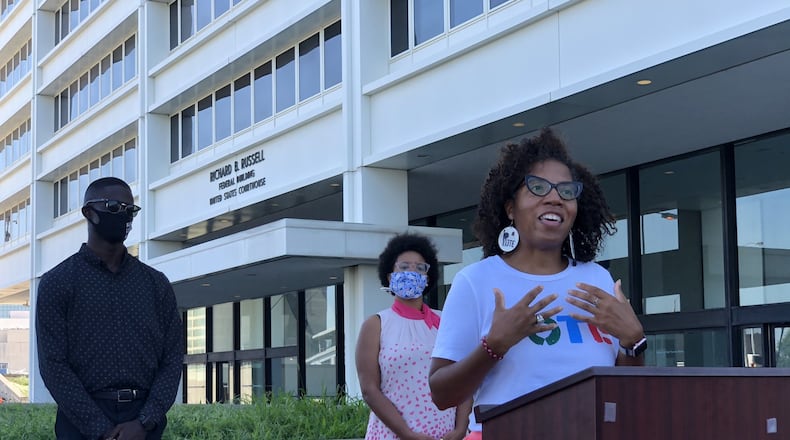A federal lawsuit filed Tuesday alleges that statewide elections to the Georgia Public Service Commission illegally leave out Black voters, resulting in an all-white board that regulates rates for power, natural gas and phone companies.
The lawsuit asks a judge to eliminate at-large elections for the Public Service Commission, whose five members are white Republicans. The only Black commissioner to ever serve on the PSC was appointed by Democratic Gov. Roy Barnes in 1999 and was then defeated after serving a six-year term.
At-large voting denies Black voters an opportunity to elect their preferred candidates, according to the lawsuit. About 30% of Georgia voters identified themselves as Black when they registered, but they’re always outnumbered by the state’s majority-white voting population in statewide elections.
“These folks deserve to have their votes count and have the same weight as everybody else in the state,” said Wanda Mosley, a plaintiff in the lawsuit and a senior coordinator for Black Voters Matter, a voting rights group. “This current system is steeped with biases that prevent Black voters from having an opportunity to elect someone who will govern with their best interests in mind.”
The lawsuit is based on the Voting Rights Act of 1965, which prohibits racially discriminatory voting laws. The plaintiffs are members of the NAACP, Black Voters Matter and Georgia Conservation Voters.
The PSC last year approved rate increases for Georgia Power, which is building the nuclear expansion of Plant Vogtle, and Atlanta Gas Light, which provides pipelines for 1.6 million customers of natural gas marketers.
Commission members are required to live in one of five districts: metro Atlanta, North Georgia, South Georgia, and the east and west halves of Middle Georgia. But voters across the entire state are allowed to vote for all commission seats.
The Georgia General Assembly, which has a Republican majority, redraws PSC districts once a decade, a process that will occur next year.
“The Legislature sets the rules for the Public Service Commission, and their collective voice is the only one that matters,” said Tim Echols, the vice chairman of the commission. “I plan to run again for my seat in 2022 even if it is changed.”
The plaintiffs proposed five PSC districts, at least one of which would have a Black-majority population.
In this year’s elections, two PSC seats are on the ballot.
Longtime Republican Commissioner Lauren “Bubba” McDonald faces Democrat Daniel Blackman and Libertarian Nathan Wilson. In addition, Republican Commissioner Jason Shaw will be opposed by Democrat Robert G. Bryant and Libertarian Elizabeth Melton.
The lawsuit is unlikely to be resolved before this November’s election, but it could change how voters choose PSC members in the future, said Bryan Sells, an attorney for the plaintiffs.
About the Author






